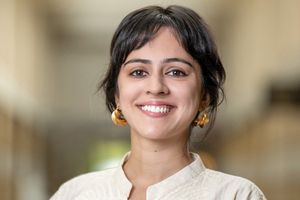
Maira Hayat has joined the core faculty of the Kroc Institute for International Peace Studies as assistant professor of environment and peace studies. She is one of six new faculty members appointed by the University of Notre Dame’s Keough School of Global Affairs this fall. Hayat is also a concurrent faculty member in the Department of Anthropology.
“I’m very excited about being part of an interdisciplinary space,” said Hayat. “It’s exciting to be able to talk about the same questions and topics with someone who works with very different research methods...I appreciate immensely the publicly-engaged and policy-relevant aspect of my colleagues’ work. It is a constant reminder about our audiences, who our work is accountable to, and the multiple and concrete ways in which academic work can be valuable.”
Hayat’s hiring is part of the Kroc Institute’s expanding focus on environment, climate change and peace studies, growing out of commitments in the Institute’s 2018-2023 strategic plan.
“Maira’s research and teaching will enhance the Kroc Institute’s commitment to focus on climate change and environmental justice,” said Asher Kaufman, John M. Regan, Jr. Director of the Kroc Institute. “Maira also employs an intersectional lens through her studies on the anthropology of the environment, and will thus contribute to the Institute's initiative on intersectionality and justice.”
Hayat is a sociocultural anthropologist, and conducts research at the intersection of the environment, bureaucracy, and law, drawing on ethnographic and archival methods. Animated by postcolonial critique, Hayat’s research has focused on Pakistan, home to the world’s largest irrigation network. Her work also intersects with peace studies through an interest in studying disputes, disagreements and conflict over water availability and distribution.
“I’m interested in how power differentials – as materialized in, for instance, very unequal land ownership patterns – determine when/whether a conflict even arises, how it travels through bureaucratic and court hierarchies, and if and how it gets resolved,” said Hayat. “When a conflict resolution is unjust, how is it recognized as such and by whom?”
Before coming to the Kroc Institute, Hayat was a postdoctoral fellow in Stanford University’s Department of Anthropology and at the Stanford Woods Institute for the Environment. Her community-engaged teaching on environmental violence and justice has been awarded a Cardinal Course Grant Award for Public Service and an artsCatalyst Grant (at Stanford University) and a Starr Lectureship Award at the University of Chicago.
Hayat’s first book project, currently underway, is based on her doctoral dissertation, “Ecologies of Water Governance in Pakistan: The Colony, the Corporation and the Contemporary,” which won the 2019 S. S. Pirzada Annual Dissertation Prize for best dissertation on Pakistan. A chapter from her dissertation also won the Association for Feminist Anthropology’s 2018 Sylvia Forman Prize for Outstanding Graduate Paper.
In addition to working on finalizing her book, Hayat has spent time “learning the ways of South Bend’s water” since moving to the area.
“On my first day in the city, no fewer than six people told me I needed to look into softening the ‘very, very hard water’ here. There’s also a pipe at my place that is prone to bursting every few weeks,” said Hayat. “It’s led me to probe the politics of water infrastructure and quality in the city. I’m also building relationships with environmental organizations in the area.”
Hayat’s research has been supported by the Wenner-Gren Foundation, the National Science Foundation, and the American Institute of Pakistan Studies, and has appeared in the Anthropology of Work Review, Critique of Anthropology, and Journal of the Anthropological Society of Oxford among others.
Hayat holds a Ph.D. in anthropology from the University of Chicago.